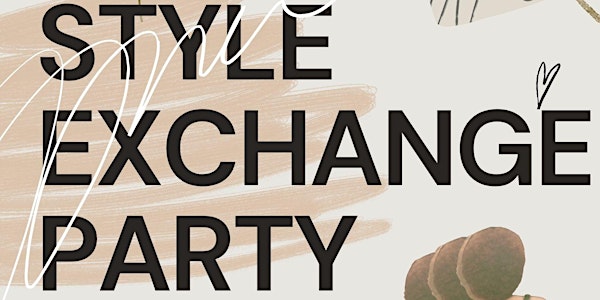
Style Exchange at Tooting Market - 2nd RELEASE ( Monthly FREE Club)
Style Exchange at Tooting Market - 2nd RELEASE ( Monthly FREE Club)
Location
Mezzanine
20 Totterdown Street #Unit 4 London SW17 8TA United KingdomAbout this event
Clothes Swap at The Mezzanine Bar, Tooting Market.
Best entrance is 20 Totterdown Rd, SW178TA ( Tooting Market side door)
From 5pm till 8pm
Swap will start at 6pm so we can organise the stock we receive from all our guests.
Womenswear only
( No shoes and no accesories due to lack of storage space post event)
IMPORTANT: We dont accept Primark, Boohoo or Shein..
Join our new monthly club to:
- Swap till you drop!!! Free womenswear clothes swap. How it works? Bring 5 or more items in perfect condition. You will receive tokens that you can exchange for other clothes!!! IMPORTANT: Brands not accepted: Primark, Boohoo and Shein. You can donate that to a charity shop.
- Repair Corner: Bring items that need a fix
- Connect with likeminded local fashionistas and make new friends in a safe space.
We will add some extra activities throughout the year such as:
- Upcycle Workshops
- Sustainable Styling
- Crochet
- Jewellery
- Macrame
- Accesories
- And many more..
Why we promote the concept of sustainable fashion for women???
Women are increasingly drawn to sustainable fashion for a variety of reasons, reflecting a growing awareness of the environmental, ethical, and social impact of the fashion industry. Here are several key reasons why women are embracing sustainable fashion:
- Environmental Consciousness: Women are becoming more environmentally conscious and are concerned about the negative impact of fast fashion on the planet. Sustainable fashion, which promotes eco-friendly practices such as ethical sourcing, reduced waste, and the use of organic materials, aligns with their values of environmental stewardship.
- Ethical and Fair Labor Practices: Many women are advocating for fair labor practices and ethical treatment of workers in the fashion industry. Sustainable fashion often emphasizes transparency in the supply chain, fair wages, and safe working conditions, addressing concerns about exploitation and unfair labor practices.
- Quality Over Quantity: Sustainable fashion encourages a shift from a disposable, fast-fashion mindset to one that values quality over quantity. Women are increasingly interested in investing in well-made, durable pieces that stand the test of time, reducing the need for constant replacement and minimizing overall environmental impact.
- Unique and Timeless Style: Sustainable fashion often promotes unique, timeless designs that stand apart from mainstream trends. Women appreciate the individuality and craftsmanship of sustainable pieces, contributing to a personal and distinctive style that transcends fleeting fashion trends.
- Supporting Small and Local Businesses: Sustainable fashion often involves supporting smaller, local, or artisanal businesses that prioritize ethical and sustainable practices. Women value the connection to these businesses and the positive impact their purchases can have on local economies.
- Cruelty-Free and Vegan Options: The rise of cruelty-free and vegan fashion options appeals to women who are conscious of animal welfare. Sustainable fashion brands that eschew the use of animal products offer stylish alternatives that align with ethical values.
- Minimalist and Capsule Wardrobe Trends: The minimalist and capsule wardrobe trends emphasize owning a curated collection of versatile, high-quality pieces. Sustainable fashion aligns well with these trends, as it often emphasizes the creation of timeless, versatile items that can be mixed and matched to create a variety of looks.
- Social Responsibility and Empowerment Women are increasingly drawn to fashion brands that prioritize social responsibility and community empowerment. Sustainable fashion brands may engage in community development projects, support social causes, or empower marginalized groups, resonating with consumers who seek to make a positive impact through their purchases.
- Educational Resources and Awareness: The availability of educational resources and increased awareness through social media and other platforms have empowered women to make more informed choices about their fashion consumption. As women learn about the environmental and social impacts of the fashion industry, they are more likely to choose sustainable alternatives.
- Long-Term Cost Savings: While sustainable fashion may have a higher upfront cost, women recognize that investing in quality pieces can lead to long-term cost savings. Well-made items tend to last longer, reducing the frequency of replacements and the overall financial impact on the consumer.
In summary, women are drawn to sustainable fashion for its alignment with values such as environmental consciousness, ethical practices, and a desire for unique, timeless style. The shift toward sustainable fashion reflects a broader commitment to responsible consumerism and a more holistic approach to personal style.
Learn more:
www.goinspireuk.org